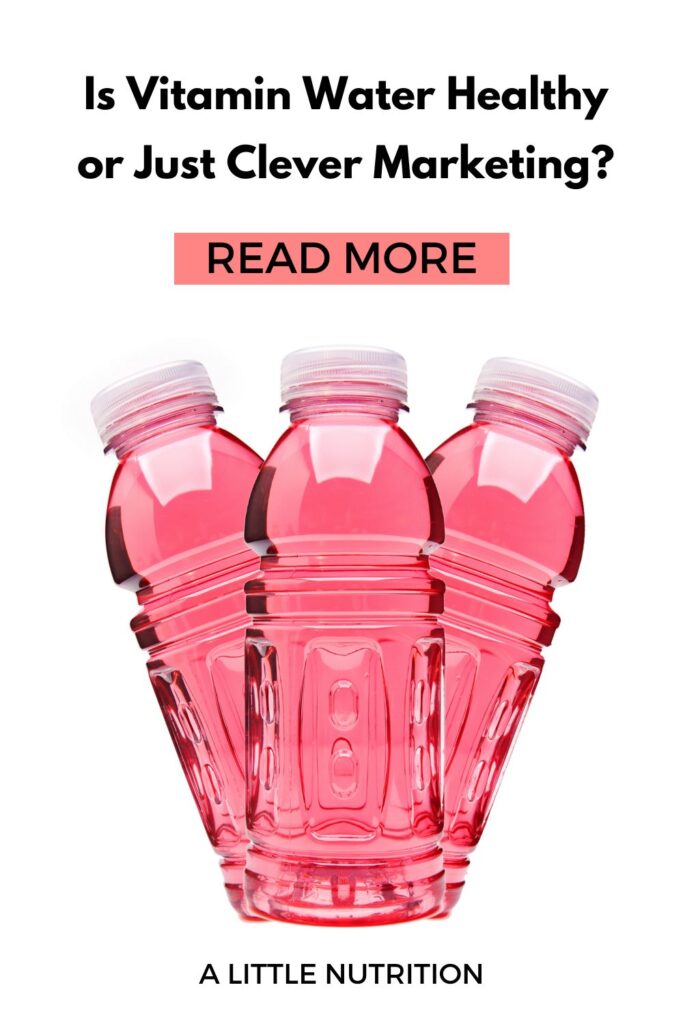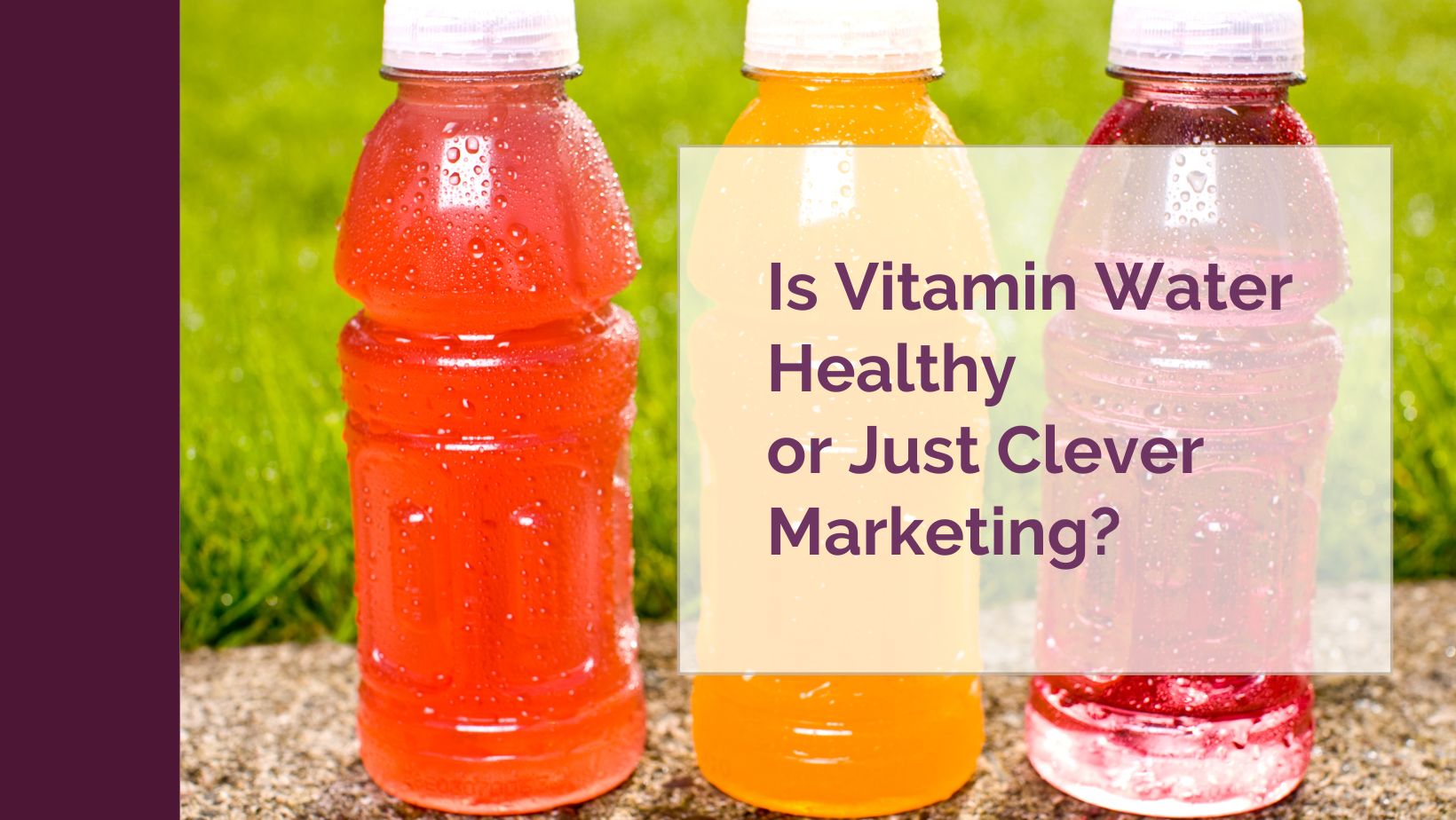Table of Contents
As a dietitian, people frequently ask me about the latest trends in the food industry. One popular topic that often comes up is vitamin-enhanced water. While the idea of obtaining additional vitamins and nutrients through your water might seem attractive, the reality is that it’s often more about marketing than actual health benefits. In this article, we’ll take a closer look at this often-confusing topic to determine whether vitamin water is genuinely healthy. Or merely another cleverly marketed drink. We’ll analyze the facts and expose false promises, enabling you to make informed decisions about what you and your family consume. So, let’s delve in and discover the truth behind vitamin water!
What is vitamin water, and what does it contain?
Vitamin water is a flavored beverage whose manufacturer promotes a healthier option to regular water. It consists of water-soluble minerals and vitamins like A, C, and a variety of B-group vitamins and often features electrolytes and sweeteners, either natural or artificial. The intention behind vitamin water is to provide extra health benefits beyond those present in regular water. Vitamin water’s distinct taste comes from its natural or artificial flavors, sweeteners, and other ingredients.
Exploring the Pros and Cons of Drinking Vitamin Water: Is It Good for Your Health?
First and foremost, it’s important to remember that we don’t need vitamin-enhanced water to meet our nutritional needs. Our bodies are incredibly adept at getting the nutrients we need from the foods we eat. Eating a balanced pattern of eating, like, three meals a day and 2-3 snacks, with all three food groups, will get us most of what our bodies need. In some situations, people may need to supplement their eating with specific vitamins or minerals. Some people need to supplement during pregnancy or if they have a medical condition affecting nutrient absorption. However, for most people, a balanced diet is sufficient.
Additionally, food companies market certain products as healthier than they actually are by creating a “health halo” around them. Vitamin-enhanced water is a perfect example of this. While it may seem like an excellent way to get extra vitamins and nutrients, the reality is that the amounts of these vitamins and minerals in the water are often negligible, and you’re better off getting your vitamins from whole foods.
In fact, consuming excessive vitamins and minerals can adversely affect your health. After use, the human body expels or stores the vitamins and minerals it needs. In fact, a lot of our food supply is fortified with extra vitamins and minerals as a public health initiative. Governments fortify many everyday food items to prevent illness and deficiency. Some examples include vitamin D in milk, folate in flour, and fluoride in our water supply.
Refer to Health Canada’s list of foods that must or may have added vitamins, mineral nutrients, and amino acids.
More is not always better.
Certain vitamins taken in excess or mega doses may be toxic, and you must be mindful of what you consume. Vitamins come in two types: water-soluble and fat-soluble. Our body flushes out excess consumption of water-soluble vitamins through urine, resulting in a lower risk of toxicity. In contrast, fat-soluble vitamins are absorbed slowly and stored for an extended period. Fat-soluble vitamins, such as vitamins A and D, can build up in our bodies and cause health problems if consumed excessively.
Adopt a food-first approach to nourishment.
We encourage our clients to adopt a food-first approach to ensure they get all the nutrition their body needs for optimal health and well-being. While supplements, pills, and powders may seem like an easy solution to meet nutritional needs, they should not be a substitute for a balanced eating pattern (if possible). Consuming a wide range of whole foods, including fruits, vegetables, whole grains, and protein sources, provides essential vitamins and minerals that work synergistically in the body. This approach offers numerous benefits, including better absorption of nutrients and lower risk of toxicity, which is a concern with over-supplementation. Furthermore, by relying on whole foods, you can obtain adequate fiber, antioxidants, and other beneficial plant compounds that are unattainable through supplements. Hence, a food-first approach is a sustainable and safe way to meet your nutritional needs and improve overall health.
What if an individual requires a vitamin supplement?
Some people may require vitamin supplementation depending on one’s health concerns or dietary patterns. Especially if food alone can not meet their dietary requirements. In such cases, a consultation with a healthcare professional or a registered dietitian can provide valuable insights into whether a vitamin supplement is necessary and which specific supplement is required. While supplements can provide additional nutrients, relying solely on them to meet nutritional needs may harm overall health.
For individuals who need vitamin supplements due to the inability to meet their nutritional needs through food intake, vitamin water alone is unlikely to suffice as its nutrient levels are too low to combat deficiencies or provide sufficient supplementation. However, if someone does not consume fruits and vegetables, most vitamin waters can fulfill their minimum vitamin C requirement 0f 60 mg/day. Nonetheless, there are alternative food options that can offer the same benefits:
- Kiwi (1 medium-sized fruit)
- Strawberries (3/4 cup)
- Sweet red pepper (1/2 cup, raw)
- Orange (1 medium-sized fruit)
If you enjoy the taste of vitamin-enhanced water, there’s no harm in drinking it occasionally. However, consuming it to fulfill your nutritional requirements is unnecessary. Consider it as an alternative to drinks like juice or soda, and enjoy it for its flavor. Typically, individuals who maintain a balanced and nutritious pattern of eating are unlikely to require additional vitamin B or C supplements. Since these vitamins are water-soluble, the excess gets excreted out of the body. Therefore, focus on consuming a well-rounded eating pattern consisting of whole foods to get the necessary nutrients. Remember that the most effective approach to obtaining the nutrients your body requires is by consuming foods, not supplements.
Pin Me For Later






More Stories
Avocado Cacao Mousse – JSHealth
Janelle Brown on Garrison’s Mental Health Before His Death
How To Finally Beat Insomnia